Our First Debate!
Results...I was very pleased with how both teams performed overall. This was a great introductory experience to the form and function of debate. Opening speeches were well thought-out and comprehensive. Both teams did a good job anticipating the counter-arguments from the other side, and rebuttal speeches were well prepared and smoothly delivered. I felt there was a good balance of logos-ethos-and-pathos demonstrated throughout the arguments. The biggest challenge both teams faced was effectively articulating responses to the cross examination questions. I think all students experienced how difficult it can be to think on their feet and rebut challenging questions. Both teams lacked enough factual evidence to strongly support their side during the rounds of questioning. As I explained during the debate - your opinion on the topic only has strength in a debate if you are able to back it up with sound logic and evidence. Research, research, research! The debate was scored in categories of: factual support, comprehensiveness, persuasiveness, delivery, and effective rebuttal. And the winning team was... the Opposition Team of Olivia, Charlie, Nani, and Levi, arguing against the death penalty. Congratulations! Homework - Ethics Debate Preparation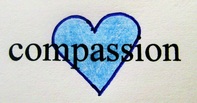 For homework this week students should read the fable "From the Elephant Pit" and answer the questions on the homework handout I provided in class. Should we show compassion in all circumstances? to all people? Write a brief (300 word) cogent argument for your position on this topic. Reference the story and provide additional examples/facts and personal experience to support your stance. Be prepared to explain and defend your position in class next week! with Michelle Cameron Final Online Journal Reviews On Monday we did a final proofread of the students' journal submissions, including the images that I handpicked for them. In two instances there was a request to change the images; otherwise, everyone was pleased with them. Both students volunteered to send me images they would find – they can do so by Wednesday, at which point, I’ll find others myself and publish the journal. I pointed out to the students that, while some of them took the revision process seriously, some did not. We talked about the fact that this is a critical aspect of finalizing their work. In some cases, I had to edit the final pieces rather dramatically – and in some, even re-made corrections that had already been suggested. While the writers seemed fine with their edited pieces, I would like to suggest that they be encouraged to pay closer attention to grammar, spelling, punctuation, paragraphing, etc., in future when handing in what should be final projects. Writing a Short Biography I asked each student to write a short (7-10 word) biography for the journal and for the reading. We discussed what made each one of them unique, including sports, other activities, pets, television and games they enjoy, siblings, etc. I think they did a wonderful job with their bios! Reading on May 5!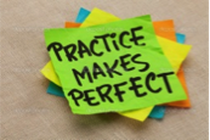 We have selected our reading order and what each writer will read. There was some discussion about some of the pieces, and how we need to balance the reading order. Then we went downstairs to the dining room to practice. We discussed certain aspects of reading that they need to pay attention to: · Planting their feet, putting their hands in a natural position, and not swaying or pacing while reading · Speaking loudly and slowly – something we’ve been practicing as they’ve read aloud in class · Looking up every once in awhile · Reading with expression – and utilizing different voices (without becoming silly) for different characters · Not getting upset or frustrated if they make a mistake – just saying something like: “Let me read that line over” · Practicing during the week so that they can read more fluidly during the day On that last note, do encourage them to practice during the week. Once a day would be ideal. If you’re not going to be at the reading (and I hope many of you will), do suggest that they practice with you as audience. If they don’t want to do that, they might want to practice in front of a mirror. We’ll begin our reading on May 5 at 10 AM in the dining room. I think you’ll be very impressed with the fine work your writers have done this session. Light refreshments will be served. Please do join us! with Leigh Ann Yoder Game Day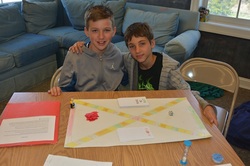 "Life of Death" "Life of Death" Today was all about fun! Each team had several minutes to introduce its game and give a brief overview of the purpose and directions. One team designed "Life of Death," a game of luck rather than skill that requires the players to collect the most hearts. 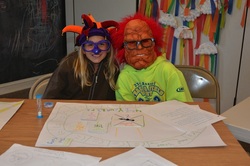 "Laugh 4 Your Life" "Laugh 4 Your Life" The next team created the hysterical "Laugh 4 Your Life" game complete with a bag of embarrassments. The goal of this skill-based game is to make people laugh. 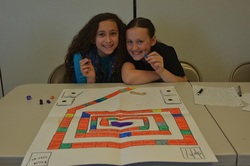 "Cops and Robbers" "Cops and Robbers" Our next team made "Cops and Robbers," where Cops need to collect cash and Robbers need the loot. This game of luck for two to five players had some twists and turns that could land you in jail. 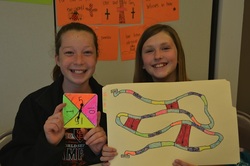 "Neon Dogs" "Neon Dogs" Another team shared '"Neon Dogs,'' a game of luck for young children not yet reading, yet able to do some simple math. You win by getting to the end of the board with the most points. 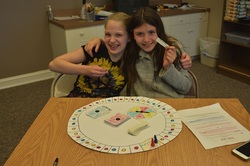 "Color War" "Color War" Finally, this team introduced "Color War," a game of luck that also requires some drawing skills. This team-based game requires teams to work together as they race to collect their mixing colors. 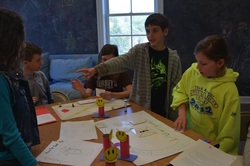 The students spent the majority of class time playing each other's games. At the end of class we spent time offering constructive criticism. Many of the ideas suggested were validated and appreciated by the makers. The teams have been asked to bring their games to our final class in June to share alongside our year-end projects. Many teams have already decided to implement some of the suggestions and improve their games.
HomeworkSemester Project: Email me your third panel concept by Friday, May 2nd.
These sites offers many ideas: http://www.sciencebuddies.org/science-fair-projects/project_ideas.shtml http://pbskids.org/designsquad/parentseducators/index.html For those students in Software or Computer Engineering they can use any of the activities from here: http://csunplugged.org/activities They can also try their hand at Scratch or use Khan Academy to teach themselves some basic programming skills. Lego Mindstorms is another option. The Story of Inventions (Optional): Read chapters 15 & 16 Board Games (Optional): Teams can continue to improve their board games with Sally Zeiner "Here we go 'round the atom tree!"Here, in our own words, is what we learned on Monday: "We were making an atom. The tree was the middle of the atom where the neutrons and protons are. We were the electrons. We learned that electrons spin around the neutrons and protons. They are very energetic if they don't have a partner. Every thing is made of atoms. We tested magnets. If there is a balanced number of electrons it would not stick. If it was uneven it would stick." with Leigh Ann Yoder The Story of Monopoly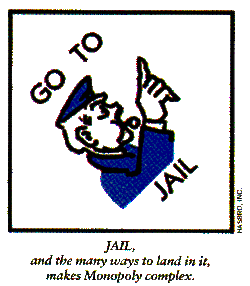 We began class with a brief story regarding the creation of Monopoly. The game was created during the depression by an unemployed engineer, Charles Darrow. He was bored and simply wanted to create a game that was fun. We talked about how the game was reflective of the economic conditions of the time and how the creator patterned the board around his vacation spot, Atlantic City, NJ. Of course, no game manufacturer wanted to produce his game. (We have seen this theme over and over again both in our class reading and in Story of Inventions.) Rather than give up, Charles decided to make and sell the game himself. Once it became a success, the game manufacturers came knocking on his door. The game continues to outsell all other games. The rest of class was dedicated to working on our own game designs. The teams worked dilegently and made quite a bit of progress. I am impressed with their desire to do their best work. I did, however, tell them that they need to remember this is a prototype. It took Charles Darrow several years to fine tune his Monopoly game, and they can't be expected to do that in a few short class periods. For example, if their design calls for 50 cards, they should only make 10 prototype cards. The focus should be on completing enough to sample the game. If teams want to continue working on it afterwards, they are certainly encouraged to do so! HomeworkSEMESTER PROJECT: Complete the first two panels (this should be mostly complete by now)
GAME DESIGN: Teams must come to class with a completed game next time we meet (4/28). This includes all needed pieces and typed instructions. As a bonus, they may consider designing a box lid as well. This will require a lot of team work. Students can either meet outside of class or communicate via email/Skype. At the end of today's class, each team was required to come up with a plan and split the work among team members. STORY OF INVENTIONS (Optional): Read chapters 13 & 14 with Michelle Cameron Conference Day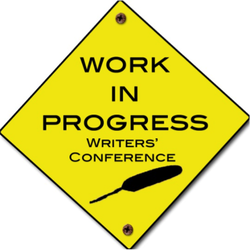 Thanks to all of you who helped your kids submit their stories and poems in time. This gave me enough time to go through all of their work thoroughly and edit as needed. To help your writers understand why I made the suggestions I made, I sat down with each one in a one-on-one conference. We reviewed the edits, talking over the ones they didn’t necessarily want to make. For the most part, they seemed receptive to my recommendations. Now that they have my editor’s comments, I ask that they revise their stories and submit them via email by this Friday, sending them to: [email protected]. This will give me a chance to input their stories into the journal and find appropriate art for each one. So their homework this week is to revise their submissions so that it is as perfect as they can make it. It’s perfectly okay to have you look it over and help them through the revision process. No Critiques Today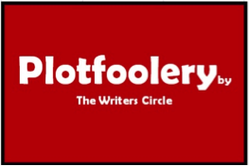 Because most of our time was spent in conference, the kids played a writing game that The Writers Circle has created, called Plotfoolery. Ask them to explain the rules to you. The idea behind the game is to help them create a cohesive story out of some very disparate (not to say “random”) ideas. I think they enjoyed it! Two More Weeks to Go - Reading on May 5 When we get back from our break, there will only be two more weeks to go. Next week, we’ll be preparing for our reading. Ask your writers to select one to two pieces that they’ve written during the past weeks to read. Remind them that it should be somewhat dramatic, as they’re going to have an audience. And I hope you’ll make up part of that audience. We’ll begin our reading on May 5 at 10 AM. Light refreshments will be served. Have a wonderful spring break! with Ed Insel Careers in EngineeringWe wrapped up our work on solar energy by studying tracking systems that keep solar panels pointed at the sun. I also explained the “grid” that delivers electricity from a dam, solar array, coal-fueled plants, or nuclear reactor via high-tension lines to local substations, neighborhood transformers, and the electrical panel in our homes. The students then paired up and reviewed two papers on the various types of engineering and what they do. They summarized their fields and briefed their classmates on field descriptions and the kinds of projects on which they work. End of Semester Project We discussed the end-of-semester project. Each student will do an individual project and show their work during the last class of the semester. Their Engineering Journal will show the work they’ve done on the topics we’ve covered. The project must be related to engineering, and some ideas are:
My point is not to drive them into Engineering but rather to impress upon them that if they even think they might want to have a career in this field they must continue challenging themselves in math and science. If you fall behind it is very difficult to catch up. Homework for Next Session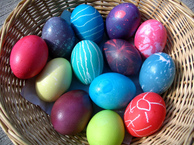 We do not have class next week, but I will be sending students a series of brief articles on specific areas of technology. They should read them and email back to me their short answers to the questions at the end of each paper. The next Current Events team for our class on 28 April should choose a current event and be prepared to explain: 1) the event they chose and 2) the role that science plays in it. Happy Easter! with Sally Zeiner Lemon Law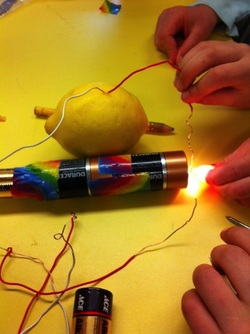 To learn more about moving electrons we built a lemon battery. The children worked diligently to connect all of the wires to the nails, pennies, and light bulb but we could not light the bulb using the lemons. The class had a great attitude towards the experiment, patiently and creatively solving problems. We did find new ways to use the batteries and lemons to get a brighter light from the bulb. Our next experiment [#8] is an exploration of magnet poles. If you have magnets at home that we can use in class please let me know. It would be wonderful if we had a set of magnets for every child tomorrow. with Ed Insel Photovoltaics II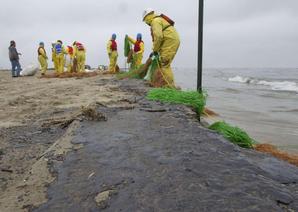 Current events this week again were very interesting. One student briefed us on the oil spill that happened this week in Houston when two barges collided, and another brought us the story of pitbulls that escaped and killed another group of dogs (you’d be surprised at how many engineering ideas came up for this one!). I added the recent discovery that satellites we already have in space can measure the amount of photosynthesis (and thus CO2 uptake) occurring on Earth. Amazing it took us so long to realize this! This led the whole group to consider the related fields of engineering: navigation, marine, chemical, environmental, aerospace, data analysis, agriculture, radio, signal-processing, and climate. We continued our work on solar energy. I demonstrated and explained fluorescence using long-wave UV light and different minerals. We then tied it into the core idea of photovoltaics: a photon of light with the right energy can free an electron from special materials and cause an electrical current to flow. If you ask your student what the key takeaway was from this session, their answer should be something like “particles of light that hit an electron can push it over the energy hump.” The kids continued working on various projects from their kits, and some students began working on a more sophisticated solar demonstrator. Homework for Next Session The next two current event volunteers should choose a current social topic and be prepared to explain 1) the topic they chose and 2) the role that science plays in it. Assignment 1 Read this article from DiscoverE on reasons for pursuing a career in engineering. Assignment 2 Start thinking about your semester-end projects or particular areas you’d like to explore. Don’t panic – you don’t have to pick one yet! We’re going to talk about the project guidelines at our next session. Wearable Technology - Hit or Fad?Students shared their thesis statements for the assigned persuasive essay topic of wearable technology. We reviewed the important components that a thesis should provide: it clearly states your opinion, it is debatable, it is reasonable and logical. Several students read aloud their entire introductions so that we could listen as a class for the hook, thesis, and preview of supporting arguments. Work in Progress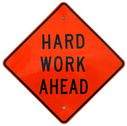 Most students are now able to articulate a position and provide a solid hook. Many continue to struggle with developing a strong thesis statement - one that is narrow enough to set the stage for developing an effective argument. When we take a position that is too broadly defined (eg. wearable technology is good for society) it becomes an overwhelming task in a 500 word essay to support this position with evidence and convince the reader of your position. The thesis should be specific enough to guide your writing and keep your argument focused throughout the essay. A related issue many students find challenging is the organization of the argument points within the body of their essay. Even with a well-defined thesis this can be challenging. A focused thesis statement limits the scope of your writing and is the great unifying force. While there may be many points you could make about a particular topic, you only want to provide those that directly support your thesis for this essay. Remember - always refer back to your outline. If you have clearly written out your thesis and body paragraph topic sentences, you can use these as a guide to keep you on track and organized through the essay. Debate Games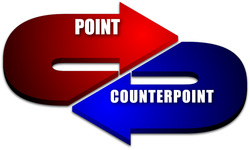 As a warm up to the debate portion of the class, which we will begin next week, students played a debate game called "Point - Counter Point". They broke into two groups of five and lined up across from each other. One group was "Pro" and the other group was "Con". I gave the groups just a few minutes to prepare arguments for or against a thesis I provided - concise one or two sentence statements of support. The Pro group began with their first team member providing an argument for the thesis (the affirmative position). The student opposite, on the Con team, was required to refute that argument and then provide their prepared argument against the thesis (the negative position). Our on-the-fly propositions were:
and
This back and forth volleying of Pro-Con arguments gave the students a quick feel for what an actual debate will feel like, requiring them to 1) work as a team to come up with logical and cohesive arguments and 2) refute a counter-argument. The most challenging aspect of this exercise by far was the requirement for students to quickly think on their feet and come up with counter-arguments to their opponents points. Next week we will discuss the format of team debate we will be using in class and go over the roles and requirements of the team members. Students will be split into debate teams and begin preparing for their first debates to be held in class on 4/28! Homework
|
Categories
All
Archives
May 2016
|


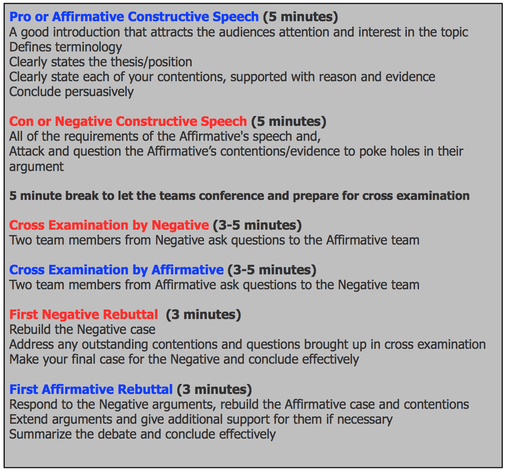
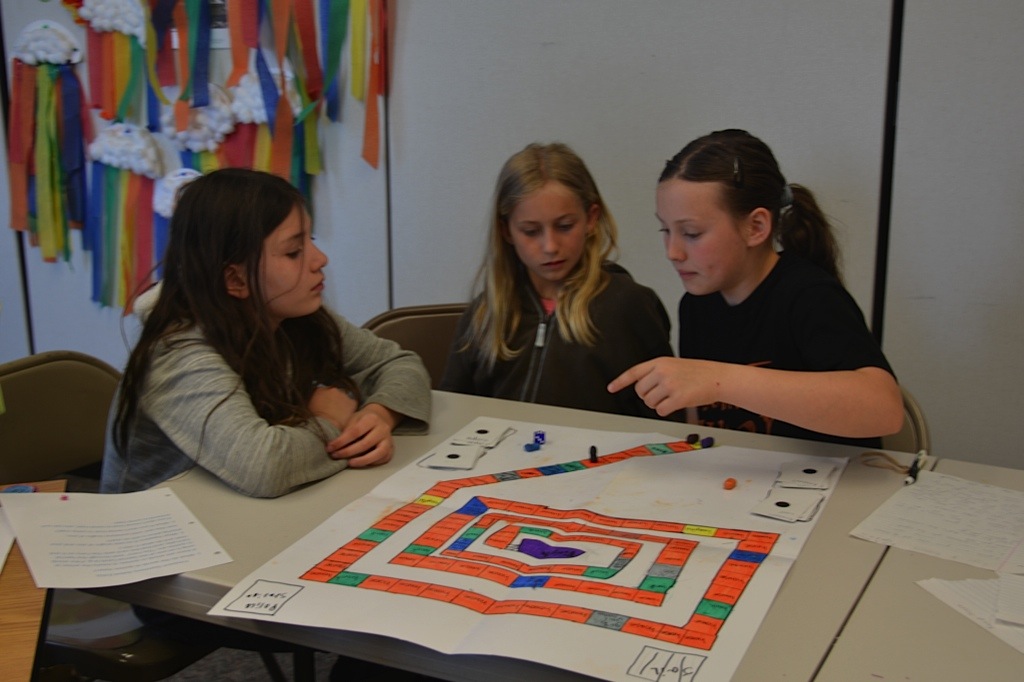
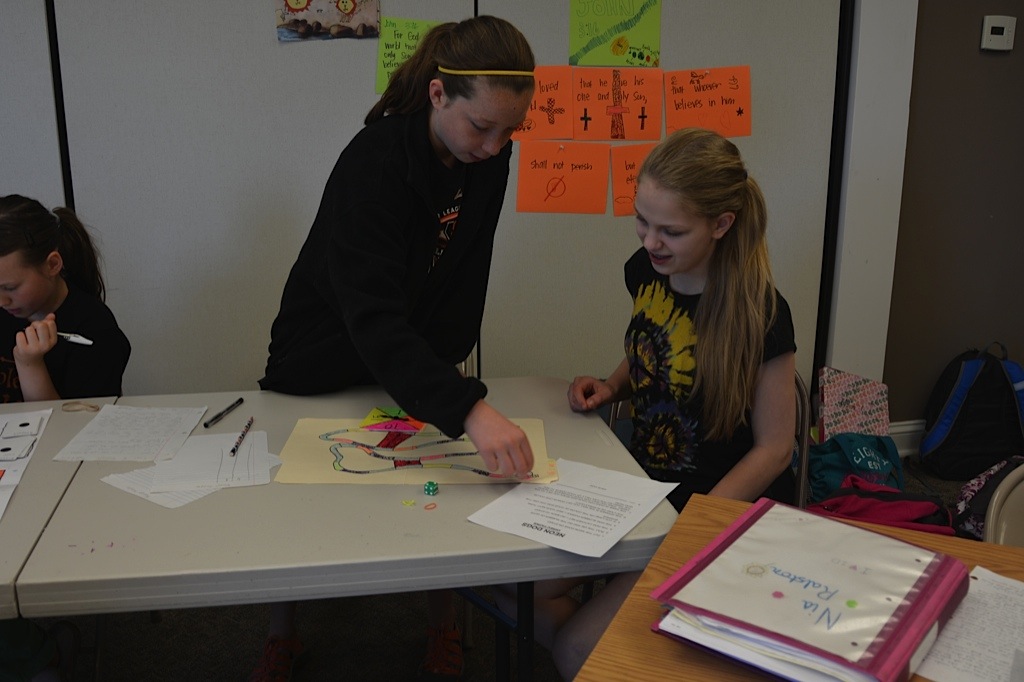
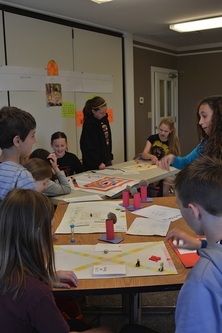
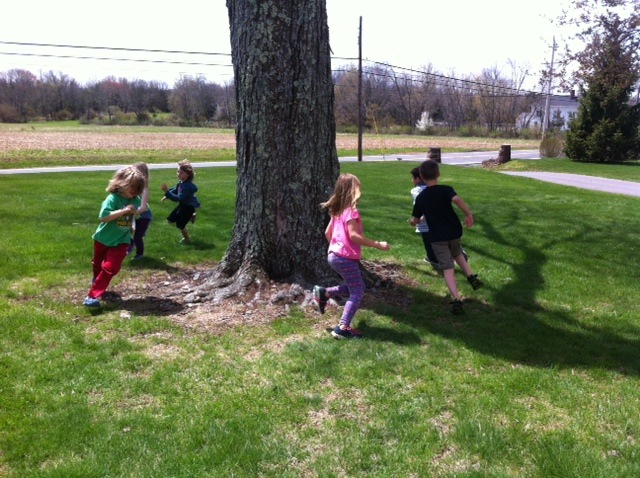
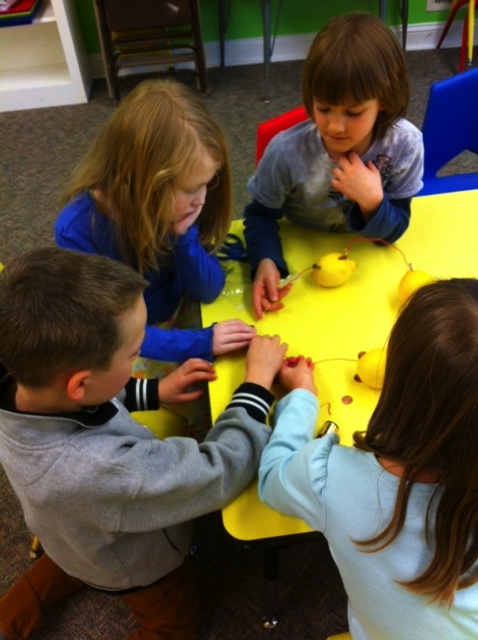
 RSS Feed
RSS Feed